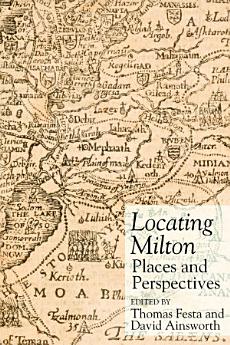Locating Milton: Places and Perspectives
About this ebook
About the author
Thomas Festa is Professor of English at the State University of New York, New Paltz. He is the author of The End of Learning: Milton and Education (2006) and some two dozen scholarly articles as well as co-editor of the award-winning feminist teaching anthology, Early Modern Women on the Fall (2012), and two previous essay collections dedicated to Milton’s works, Milton, Materialism, and Embodiment (2017) and Scholarly Milton (2019).
David Ainsworth is Associate Professor of English and a faculty member in the Hudson Strode Program in Renaissance Studies at the University of Alabama. His most recent project, Milton, Music and Literary Interpretation, constructs a methodology for reading Milton’s works through musical concepts, while arguing that Milton himself uses musical metaphors to capture the ineffable characteristics of the divine.





